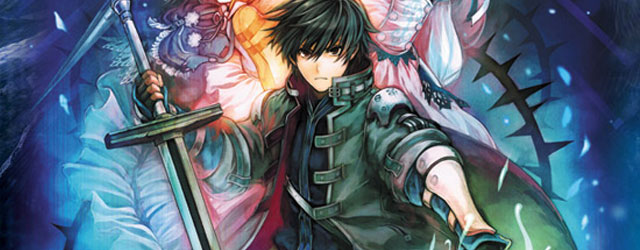[tab:Review]
Earlier this month, I feel back in love with the strategy genre thanks to Fire Emblem: Awakening. The simple concepts mixed with complex mechanics made for a challenging, rewarding and fun experience. Idea Factory and Sting’s Generation of Chaos: Pandora’s Reflection gives off the same feelings in a slightly different way. Let’s fall in love with the strategy genre all over again.
Pandora’s Reflection is a real-time strategy game with some turn-based elements. The game takes place in the land of Hades. Hades is a barren place where the poor are oppressed and a malicious ashen rain falls from the skies and slowly weakens living things until they die. People live in fear of both the ashen rain and the corrupt, wealthy men of the world. The story revolves around a young alchemist named Claude and his sister Yuri. Yuri has been inflicted with a curse that brings her constant pain. Claude uses his alchemy powers to create medicine for her, and the two travel the land in search for the highly coveted ingredient, snowdrops.
Battles take place in real time. When on the battlefield, players move a cursor around and choose different units and locations to interact with. Each side starts with a base that will allow players to dispatch units. After a unit is dispatched, the player can then give it orders to move on the map. If a friendly unit runs into an enemy on the battlefield, a fight begins. A battle scene plays out similar to a rhythm action game. The player must hit X when a gauge fills. Hitting at the right time will have the attack deal more damage. Before each battle, the player can choose an equipped weapon. Much like in Fire Emblem, certain weapon types are stronger against other kinds.
After an attack, either the player’s unit or the enemy unit is pushed back. A circle forms around the enemy, and if another opposing unit is within that circle, the player can initiate a free second attack. Proper placement can offer up numerous follow up attacks for a great advantage.
Capturing points on the map can offer up special conversations that may result in finding a new weapon or armor. There are also special locations that will allow players to dispatch more units. The enemy can capture these points as well. There are also on-map weapons that can be captured to damage enemies outside of battle. These can also push back units that may get too close to the player’s base.
Claude also has a unique ability to summon guardians and creatures to change the flow of battle. The player can use this skill at any time on the map screen for a variety of effects, like healing party members, damaging enemy units and stunning enemies. Collecting crystals awarded for attacking enemies and dropped by retreating foes will fill the meter used to summon. This skill can easily turn the tide of battle.
After each fight, the player’s party members are awarded experience points and alchemy points that can be used to upgrade weapons and level up characters. Any unwanted armor or weapons and be traded in for alchemy points. Free battles are also available for players to level up in between the story missions.
Pandora’s Reflection is driven by narrative. When not in battle, the player will read story beats and plot details through dialog and cut scenes. The tale is entertaining for the most part, despite some standard Japanese RPG tropes. These are balanced by interesting plot twists that offer up new characters.
I would have liked to see better visuals on the map. The characters look like small 16-bit sprites until battles, which use anime style stills to represent the characters. The timing on the attack gauge feels off at times. Sure, after a few hours, I got it down, but it would have been nice to have had an audio cue telling me exactly when to hit X. These are small gripes with an otherwise fantastic game.
The combat is simple to understand and play. Positioning your units is the most important part of the combat, and I felt well rewarded when pulling off a four-hit, impact circle combo during a boss fight. Unlike Fire Emblem, the game rarely gets too difficult. In fact, it may very well be too easy for some players. I believe the simplicity works to its advantage and makes for a rather fun game.
I was greatly surprised by Generation of Chaos: Pandora’s Reflection. I went in thinking this game would be an overly complex strategy game, and instead found a rather simplistic, yet rewarding experience. The story is told well, and with a few small annoyances here and there with both the story and game play, players can still have a enjoyable time playing. For only $19.99, Sony portable players should not miss this strategy game.
Review copy of game provided by publisher.
[tab:Screenshots]
[tab:END]



Mario Sergio Garcia Maciel
like the story, dislike the story…
FrustratedFury
Yeah, you know, like I enjoy the story but it has some overused tropes to it? Does that make sense?